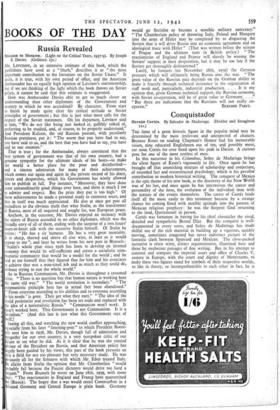Conquistador
Hernan Cortes. By Salvador de Madariaga. (Hodder and Stoughton
THE fame of a great historic figure in the popular mind may be determined by the most irrelevant and unexpected of chances. Because Keats on reading Chapman's Homer had his memorable vision, nine educated Englishmen out of ten, and possibly more, see stout Cortes for ever fixed upon his peak in Darien. A curious pose for one of the most restless of men.
In this successor to his Columbus, Senor de Madariaga brings the silent figure of Keats's vigorously to life. Once again he has brought off that astonishing mixture of scholarship and conjecture, of recorded fact and reconstructed psychology, which is his peculiar contribution to modern historical writing. The conquest of Mexico is the epic theme of his new book, as the discovery of the New World was of his last, and once again he has interwoven the career and personality of the hero, the evolution of the individual man with the texture of the events themselves. The career of Cortes lends itself all the more easily to this treatment because by a strange chance his coming fitted with terrible aptitude into the pattern of Mexican religious prophecy : he was the Serpent God returning to the land, Quetzalcoatl in person.
Cortes was fortunate in having for his chief chronicler the vivid, detailed and sympathetic Bernal Diaz. But the conquest is well- documented in every sense, and Serior de Madariaga has made skilful use of the rich material in building up a vigorous, quickly moving, sometimes congested but never indistinct picture of the fantastic clash between Spaniard and Mexican. The close-packed narrative is often witty, always argumentative, illumined here and there by exuberant passages of fine writing. But in his attempt to contrast and compare the imperial court and office of Charles V, remote in Europe, with the court and dignity of Montezuma, to make these two figures stand for symbols of their respective worlds, so like in theory, so incomprehensible to each other in fact, he is less successful. There is a little forcing of the material to compress the Emperor Charles V into the mould prepared for him. The smallness and the remoteness of the Spanish Court is skilfully emphasised to bring out the independent immensity of Cortes' achievement ; this adds to the psychological impressiveness of the presentation but partly destroys its historical balance. The book stands or falls by the interpretation of Cortes himself and is a con- tribution rather to our understanding of a single phenomenon than of the period as a whole.
The question of political leadership has arisen in it:. most urgent form in the present generation, and a life of Cortes by so original a thinker as Senor de Madariaga should be today something more than mere chronicle For Cortes was a born leader and a natural conqueror ; his life could hardly have been re-written at a more suitable moment. Yet it is precisely here, on the perennial moral issue, that Senor de Madariaga is deliberately silen:. He analyses the personal motives of the conqueror, the political theories, the beliefs and necessities of his period in elaborate detail. But neither as regards the conquest as a whole, nor the single actions of his hero, will he attempt any final judgement. He accepts, for instance, the frank statement of Cortes in which he describes the seizure-of Montezuma, and says, truly enough, that both the action and the conqueror's account of it were purely political. Cortes, he avers, felt no need for moral justification. But does Senor de Madariaga feel -one?
What is the office of the historian? Is it in fact merely to set down the facts as nearly as possible as they occurred, and to apply no criticism to them save that which is in accordance with the supposed standards of the times? Leopold von Ranke thought so, but Senor de Madariaga does not belong to this school. He makes important play throughout with the psychological motif and implies the recognition of a moral problem by emphasising the respect which Cortes showed for legal forms : his anxiety to have the question of slavery put on some clearly defined basis, and his regret for the unjust seizure of land from the natives. Yet in his summing up it is the tragedy of Cortes rather than the tragedy of Mexico which Senor de Madariaga deplores, the failures of the man as an individual, the personal errors and weaknesses and the personal greatness which alone provoke his reflections This is the fullest and soundest biography of Cortes which has yet appeared in the English language, but it leaves the essential question unanswered. Cortes the man stands out clearly and alone, but he is still, so to speak, upon his peak in Darien. Where he stands in history, and whether he fought, in the long run, for light or for darkness,



























 Previous page
Previous page